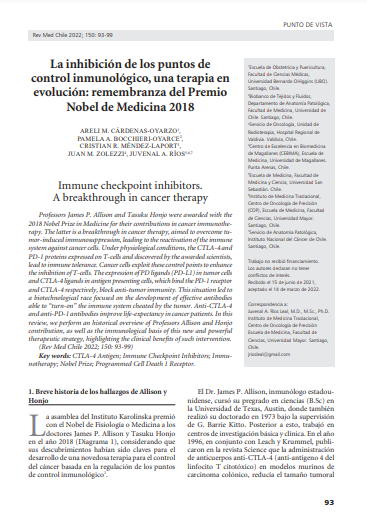La inhibición de los puntos de control inmunológico, una terapia en evolución: remembranza del Premio Nobel de Medicina 2018

Fecha
2022-01Autor
Cárdenas-Oyarzo, Areli M.
Bocchieri-Oyarce, Pamela A.
Méndez-Laport, Cristian R.
Zolezzi, Juan M.
Rios, Juvenal A. [Univ Mayor, Inst Med Traslac, Ctr Oncol Precis COP, Escuela Med,Fac Ciencias, Chile]
Ubicación geográfica
Notas
HERRAMIENTAS
Acceda a títulos restringidos
¿Cómo descargar?Resumen
Professors James P. Allison and Tasuku Honjo were awarded with the 2018 Nobel Prize in Medicine for their contributions in cancer immunotherapy. The latter is a breakthrough in cancer therapy, aimed to overcome tumor-induced immunosuppression, leading to the reactivation of the immune system against cancer cells. Under physiological conditions, the CTLA-4 and PD-1 proteins expressed on T-cells and discovered by the awarded scientists, lead to immune tolerance. Cancer cells exploit these control points to enhance the inhibition of T-cells. The expression of PD ligands (PD-L1) in tumor cells and CTLA-4 ligands in antigen presenting cells, which bind the PD-1 receptor and CTLA-4 respectively, block anti-tumor immunity. This situation led to a biotechnological race focused on the development of effective antibodies able to "turn-on" the immune system cheated by the tumor. Anti-CTLA-4 and anti-PD-1 antibodies improve life-expectancy in cancer patients. In this review, we perform an historical overview of Professors Allison and Honjo contribution, as well as the immunological basis of this new and powerful therapeutic strategy, highlighting the clinical benefits of such intervention.
URI
https://repositorio.umayor.cl/xmlui/handle/sibum/9213https://www.scielo.cl/pdf/rmc/v150n1/0717-6163-rmc-150-01-0093.pdf
http://dx.doi.org/10.4067/S0034-98872022000100093
Coleccion/es a la/s que pertenece:
Si usted es autor(a) de este documento y NO desea que su publicación tenga acceso público en este repositorio, por favor complete el formulario aquí.